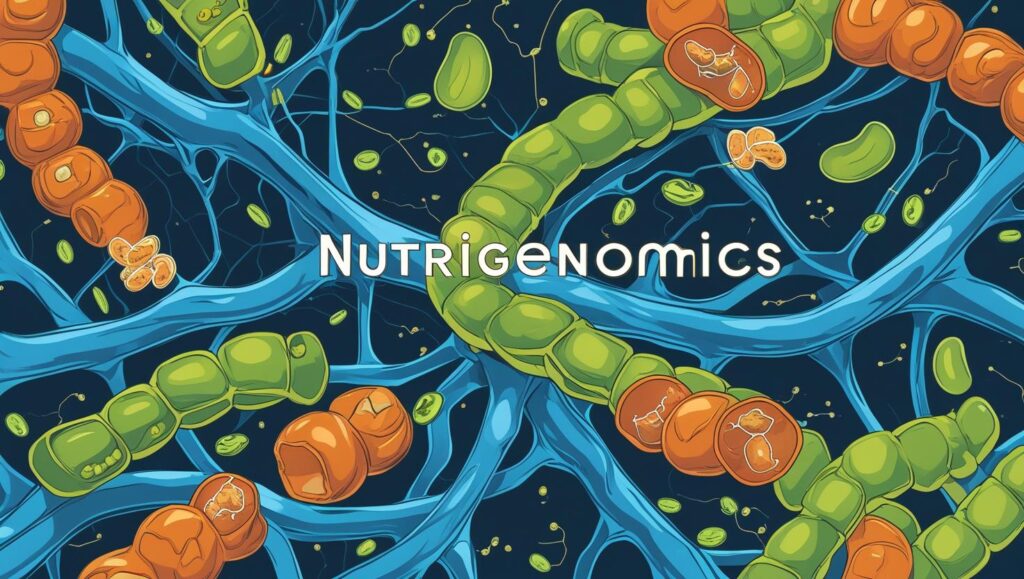
Diet and Nutrigenomics
Abstract
Nutrigenomics is an emerging field that explores the interaction between nutrition and the human genome, providing insights into how dietary components influence gene expression, metabolism, and disease risk. This paper examines the role of nutrigenomics in personalized nutrition, disease prevention, and health optimization. It discusses the impact of macronutrients, micronutrients, and bioactive compounds on gene regulation, explores advancements in nutrigenomic technologies, and highlights the potential of personalized dietary interventions in managing chronic diseases such as obesity, diabetes, cardiovascular diseases, and cancer. Additionally, the ethical, legal, and social implications (ELSI) of nutrigenomics are addressed, along with future directions in research and clinical applications.
1. Introduction
1.1 Definition of Nutrigenomics
Nutrigenomics is the study of how nutrients and bioactive food compounds interact with an individual’s genetic makeup to influence health and disease. It integrates genomics, transcriptomics, proteomics, and metabolomics to understand how diet modulates gene expression and metabolic pathways.
1.2 Importance of Personalized Nutrition
Traditional dietary recommendations follow a “one-size-fits-all” approach, but nutrigenomics enables precision nutrition by tailoring dietary advice based on genetic, epigenetic, and metabolic profiles. This approach enhances disease prevention, improves therapeutic outcomes, and promotes overall well-being.
2. Fundamentals of Nutrigenomics
2.1 Gene-Diet Interactions
- Single Nucleotide Polymorphisms (SNPs): Genetic variations that influence nutrient metabolism (e.g., MTHFR gene and folate metabolism).
- Epigenetics: Diet-induced modifications (DNA methylation, histone modifications) that regulate gene expression without altering DNA sequence.
- Nutrient-Sensing Pathways: Mechanisms like mTOR, AMPK, and sirtuins that respond to dietary signals.
2.2 Key Nutrients and Their Genomic Effects
- Omega-3 Fatty Acids: Modulate inflammatory genes (NF-κB, COX-2).
- Polyphenols (Resveratrol, Curcumin): Activate longevity genes (SIRT1, FOXO).
- Vitamin D: Regulates genes involved in immunity and calcium homeostasis.
- Fiber & Short-Chain Fatty Acids (SCFAs): Influence gut microbiota and epigenetic regulation.
3. Nutrigenomics in Disease Prevention and Management
3.1 Obesity and Metabolic Syndrome
- FTO Gene: Variants affect satiety and fat storage; personalized diets can mitigate risk.
- PPARγ Polymorphisms: Influence lipid metabolism; Mediterranean diet benefits carriers.
3.2 Diabetes and Insulin Resistance
- TCF7L2 Gene: Impacts glucose metabolism; low-glycemic diets recommended for risk alleles.
- SIRT1 Activation: Caloric restriction and resveratrol improve insulin sensitivity.
3.3 Cardiovascular Diseases (CVD)
- APOE Genotypes: E4 allele increases LDL cholesterol; low-fat diets are beneficial.
- Sodium Sensitivity: ACE gene variants affect blood pressure; potassium-rich diets help.
3.4 Cancer Prevention
- BRCA Mutations: Cruciferous vegetables (sulforaphane) may reduce cancer risk.
- DNA Methylation: Folate and B vitamins modulate epigenetic silencing of tumor suppressors.
4. Technological Advancements in Nutrigenomics
4.1 High-Throughput Sequencing & Omics Technologies
- Whole Genome Sequencing (WGS): Identifies genetic predispositions to nutrient deficiencies.
- Metabolomics: Profiles metabolic responses to dietary interventions.
4.2 AI and Machine Learning in Personalized Nutrition
- Predictive algorithms analyze genetic, microbiome, and lifestyle data for tailored diet plans.
- Apps like Nutrigenomix and DNAfit provide gene-based dietary recommendations.
4.3 Gut Microbiome and Nutrigenomics
- Microbiota composition affects nutrient absorption and gene expression (e.g., butyrate producers).
- Probiotics and prebiotics modulate host-microbiome interactions for better health outcomes.
5. Ethical and Social Considerations
5.1 Privacy and Genetic Data Security
- Concerns over misuse of genetic information by insurers or employers.
- Need for regulatory frameworks (e.g., GDPR, HIPAA).
5.2 Accessibility and Equity
- High costs of genetic testing may limit access to personalized nutrition.
- Public health strategies needed to integrate nutrigenomics into mainstream healthcare.
6. Future Directions
- Gene-Editing (CRISPR) and Nutrigenomics: Potential to correct dietary-related genetic defects.
- Wearable Nutrigenomic Devices: Real-time monitoring of metabolic responses to food.
- Public Health Integration: Government policies promoting nutrigenomic-based dietary guidelines.

7. Conclusion
Nutrigenomics represents a paradigm shift in nutrition science, enabling personalized dietary strategies for disease prevention and health optimization. While challenges remain in accessibility and ethical concerns, advancements in genomics and AI hold promise for revolutionizing global health. Future research should focus on large-scale clinical trials and public education to maximize the benefits of nutrigenomics.